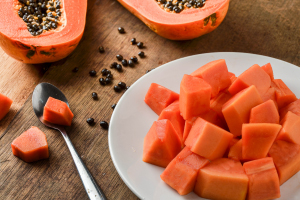

Cabbage is a member of the cruciferous family. This leafy green vegetable has surprising nutritional quotients, including antioxidants. So, you are not wrong if you give it a priority in your diet. But, before moving ahead, it is important to know the cabbage nutrition value and then cook your favourite cabbage recipes.
Nutritional Value of Cabbage
This nutritious vegetable is a complete pack of vitamins, minerals, and other essential compounds.
- Vitamins
The major cabbage vitamins include C, A, and K. The lutein and zeaxanthin elements of cabbage protect the retina and help to cure vision damage. These two are the types of vitamin A. The vitamin K is good for people who are using blood thinners like coumadin. Also, vitamin C increases immunity and protects from cancer. Studies show that the anticancer property of cabbage plays a crucial role in preventing breast, pancreatic, and pulmonary cancers.
- Fibre
Cabbage is an excellent source of dietary fibre. Each cup of chopped cabbage provides 2 grams of fibre. The fibre promotes a healthy digestion system, keeps the stomach and intestine strong, and improves bowel movement.
- Antioxidants
Cabbage has antioxidants, and it can help your body to fight against cancer. Specifically, it contains a sulphur-containing compound named glucosinolates, which builds your immune system to fight against cancer. Also, glucosinolates and phytochemicals reduce oxidative stress and inflammation. The green cabbage contains antioxidants like quercetin, kaempferol, and apigenin. The red cabbage contains cyaniding, which has anticancer, anti-obesity, and anti-diabetic properties.
- Minerals
Cabbage contains essential minerals like potassium, which plays a crucial role in regulating blood pressure and muscle contractions, and manganese, necessary for bone health and metabolism.
Benefits of Eating Cabbage
The consumption of this vegetable offers numerous positive effects on health, thanks the cabbage nutrition profile:
- Digestive Health: Cabbage contains high fibre content. It helps regularise bowel movements and boosts immunity by shielding your body from pathogens.
- Cancer Prevention: Antioxidants and phytonutrients present in cabbage help lower the likelihood of developing colon, breast, and prostate cancer.
- Heart Health: Cabbage consumption leads to increased potassium levels, which aid in regulating blood pressure and reducing heart disease risk. Heart health benefits also come from the fibre content, which helps lower cholesterol levels.
- Weight Loss: Cabbage lends satiety and reduced overall calorie consumption can be accomplished through its aid.
- Skin Health: Collagen production, crucial for healthy and youthful-looking skin, is enhanced by vitamin C found in cabbage. With the inclusion of vitamin E in cabbage, antioxidant protection is offered to the skin.
- Gut Health: Promoting the growth of beneficial gut bacteria, cabbage fiber acts as a prebiotic. For general wellness and immune system support, having a healthy gut is essential.
Side Effects of Cabbage
While there are numerous benefits of eating cabbage, it is vital to be aware of potential side effects, which can include:
- Flatulence
Cabbage’s high fibre content can lead to gas and bloating in some individuals, especially when consumed in large quantities. Gradually introducing cabbage into your diet can help reduce these effects.
- Thyroid Interference
Cabbage contains compounds called goitrogens, which can interfere with thyroid function when consumed excessively. However, cooking cabbage can partially deactivate these compounds.
- Cabbage Worms
Cabbage worms are a common issue for cabbage growers. These small green caterpillars feed on cabbage leaves and can significantly damage crops if not managed effectively.
Addressing Safety from Cabbage Worms
Here is how you can get rid of cabbage worms from your store-bought produce:
- Inspect properly: It is crucial to check for chewed leaves and small green caterpillars, the tell-tale signs of worm presence.
- Wash thoroughly: Wash cabbage under running water and let it sit in a solution of part vinegar to 3 parts water. This helps kill the worms.
- Blanche or freeze: You can also blanch the cabbage or freeze it for a day to kill the worms.
- Neem Oil: If you are growing cabbage in your kitchen garden, try applying neem oil to them. This oil acts as a natural deterrent against cabbage worms.
Conclusion
Cabbage nutrition is undoubtedly very high, offering an array of benefits of eating cabbage. From supporting digestive health to potentially reducing the risk of chronic diseases, cabbage certainly deserves a place in your diet. However, it’s crucial to be aware of potential side effects such as flatulence and thyroid interference, especially if consumed in excessive amounts.




